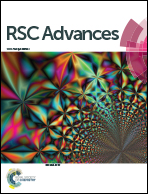Chlorhexidine-loaded functionalized mesoporous MCM-41 poly(methylmethacrylate) based composites with Candida antibiofilm activity†
Abstract
The complete or partial dentures made of acrylic resins or composites constitute the support for Candida biofilm with consequent onset of stomatitis and candidiasis. In this paper, polymethylmethacrylate composites containing chlorhexidine are prepared. The drug was loaded inside the mesopores of the silicate MCM-41 which had been properly silanized with an acrylic coupling agent. Four different chlorhexidine loaded composites were prepared using MCM-41 silanized with four different amounts of 3-methacryloxypropyl-trimethoxisilane. The composites prepared showed a decreased resin polymerization degree in comparison to the pure resin. The composite obtained with MCM-41 with the lowest silanization degree, showed a good polymerization degree, higher than that obtained when free chlorhexidine was added to the resin. This composite was able to decrease Candida biofilm adhesion and formation and inhibited Candida biofilm proliferation for the duration of the test (120 days).


 Please wait while we load your content...
Please wait while we load your content...